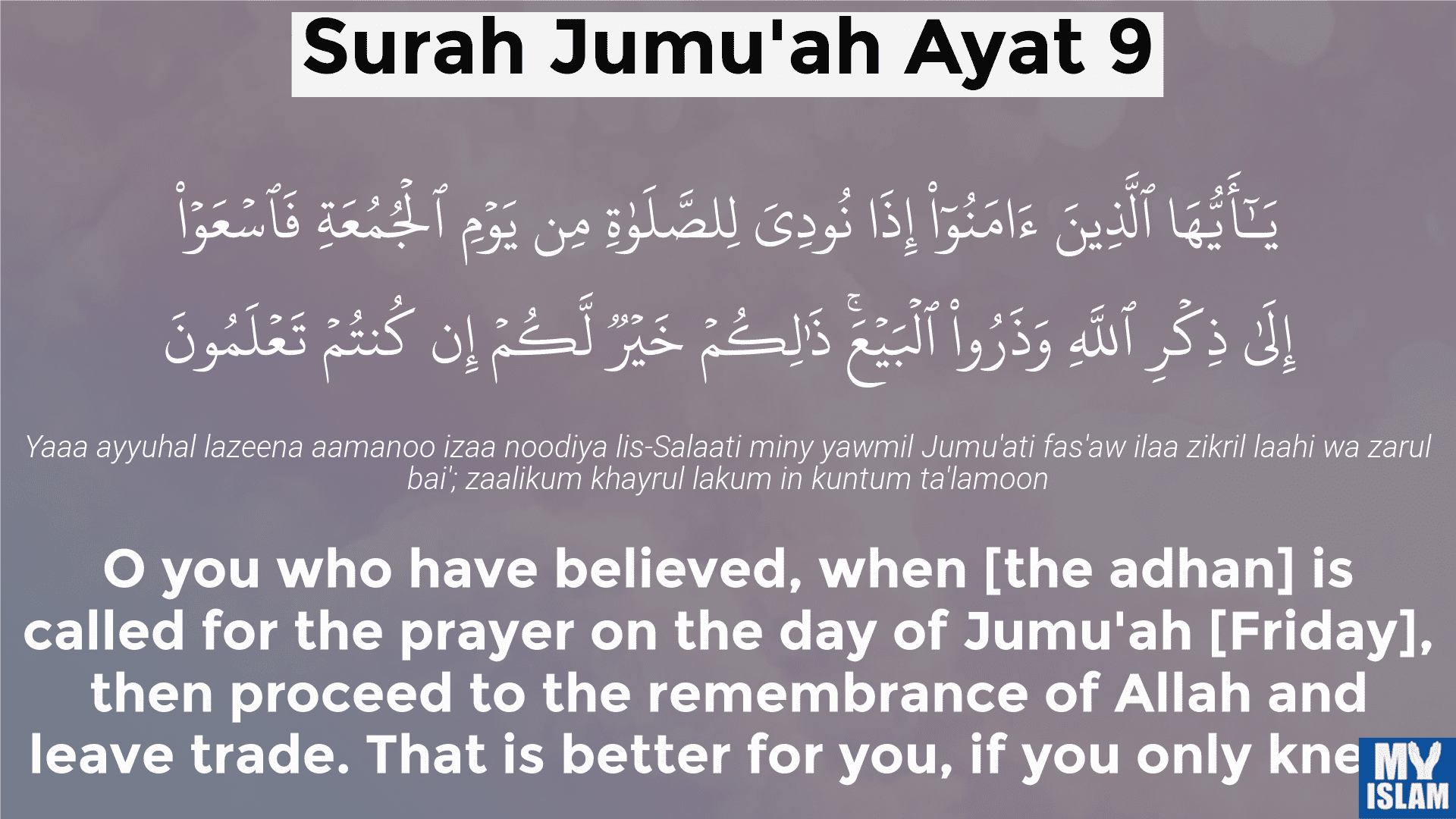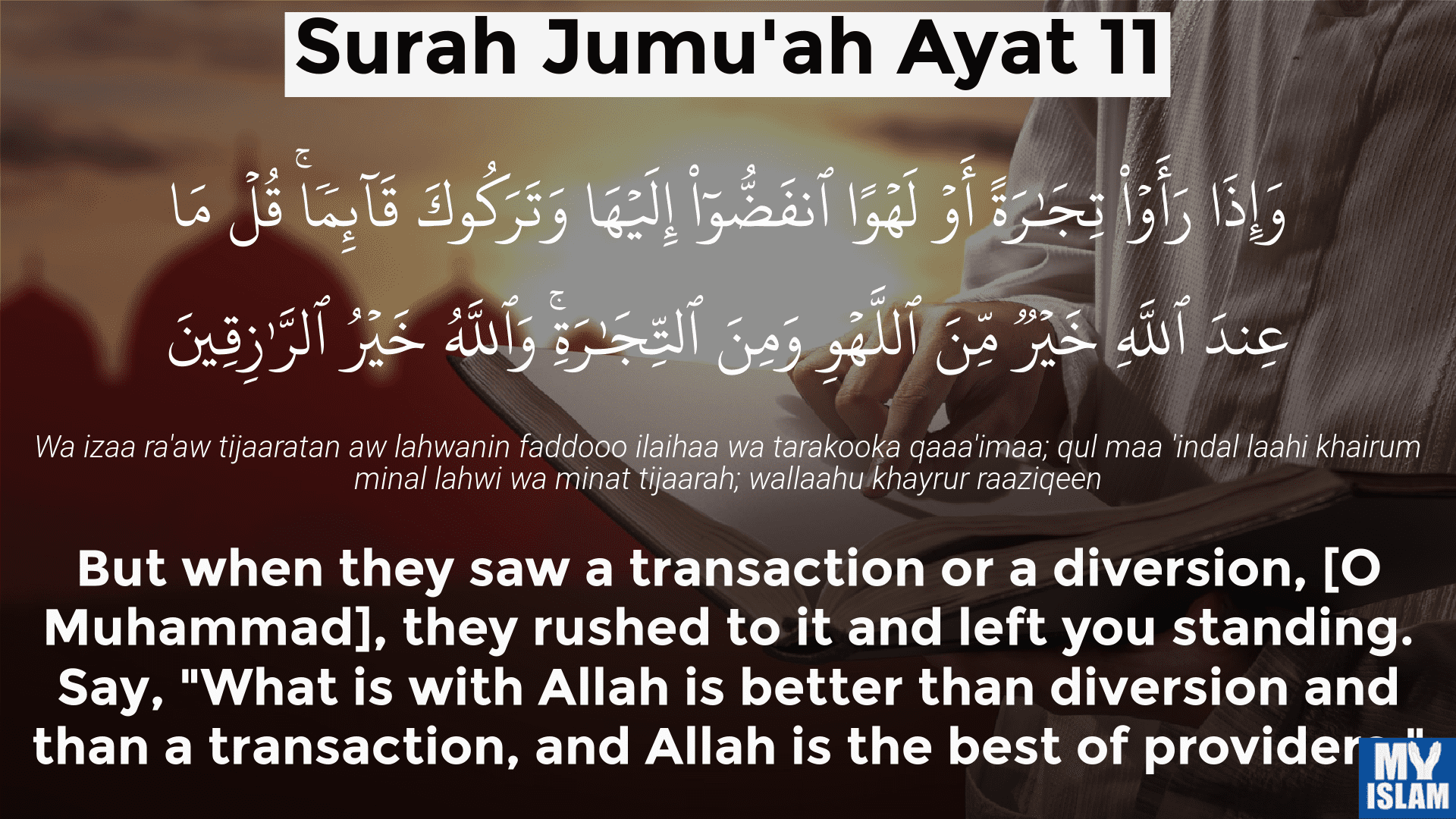Surah Jumu’ah Ayat 9 in Arabic Text
English Translation
Here you can read various translations of verse 9
O you who have believed, when [the adhan] is called for the prayer on the day of Jumu’ah [Friday], then proceed to the remembrance of Allah and leave trade. That is better for you, if you only knew.
O ye who believe! When the call is proclaimed to prayer on Friday (the Day of Assembly), hasten earnestly to the Remembrance of Allah, and leave off business (and traffic): That is best for you if ye but knew!
Believers, when the call for Prayer is made on Friday, hasten to the remembrance of Allah and give up all trading. That is better for you, if you only knew.
O you who believe (Muslims)! When the call is proclaimed for the Salat (prayer) on the day of Friday (Jumu’ah prayer), come to the remembrance of Allah [Jumu’ah religious talk (Khutbah) and Salat (prayer)] and leave off business (and every other thing), that is better for you if you did but know!
O ye who believe! When the call is heard for the prayer of the day of congregation, haste unto remembrance of Allah and leave your trading. That is better for you if ye did but know.
O you who have believed, when it is called out for prayer on Friday, (the Day of Congregation), then endeavor (to hasten) to the Remembrance of Allah and leave out (your) trading. (Literally: selling) That is most charitable (i.e. best) for you, in case you know.
Believers, do not let your wealth and your children distract you from remembering God: those who do so will be the ones who lose.
اے وه لوگو جو ایمان ﻻئے ہو! جمعہ کے دن نماز کی اذان دی جائے تو تم اللہ کے ذکر کی طرف دوڑ پڑو اور خرید وفروخت چھوڑ دو۔ یہ تمہارے حق میں بہت ہی بہتر ہے اگر تم جانتے ہو
Quran 62 Verse 9 Explanation
For those looking for commentary to help with the understanding of Surah Jumu’ah ayat 9, we’ve provided two Tafseer works below. The first is the tafseer of Abul Ala Maududi, the second is of Ibn Kathir.
Ala-Maududi
(62:9) Believers, when the call for Prayer is made on Friday,[14] hasten to the remembrance of Allah and give up all trading.[15] That is better for you, if you only knew.
14. Three things in this sentence are particularly noteworthy:
(1) That call to the Prayer is mentioned here.
(2) That the mention is of the call to such a Prayer as has to be performed particularly only on Fridays.
(3) That these things have not been mentioned so as to suggest that the call is to be made for the Prayer and a particular Prayer is to be performed on Friday, but the style and context clearly show that the call to the Prayer and the particular Prayer were both already being performed and practiced on Friday.
The people, however, were being negligent in that on hearing the call to the Prayer. They would not hasten to it but would remain occupied in their worldly activities and trade and business transactions. Therefore, Allah sent down this verse to make the people realize and appreciate the importance of the call and the Prayer and to exhort them to hasten to perform it as a duty. If these three things are considered deeply, they prove this absolute truth that Allah enjoined on the Prophet (peace be upon him) certain commands which were not revealed in the Quran, and these commands were also as obligatory as those revealed in the Quran itself. The call to the Prayer is the same as adhan which is being called the world over five times daily in every mosque. But neither its words have been stated anywhere in the Quran nor the method of calling the people to the Prayer has been taught. Its method was prescribed by the Prophet (peace be upon him). The Quran has only confirmed it twice, here and in Surah Al-Maidah, Ayat 58. Likewise, this particular Prayer of Friday, which the Muslims of the entire world are performing has neither been enjoined in the Quran nor its time and method of performance described anywhere. This was also prescribed by the Prophet (peace be upon him), and this verse of the Quran was revealed only to stress its importance and obligatory nature. In spite of this express argument anyone who claims that the Shariah commandments are only those which have been stated in the Quran, is not in fact a denier of the Sunnah but of the Quran itself.
Ibn-Kathir
9. O you who believe! When the call is proclaimed for the Salah on Al-Jumu`ah (Friday), then hasten (Fas`aw) to the remembrance of Allah and leave off business. That is better for you if you did but know! 10. Then when the Salah is complete, you may disperse through the land, and seek the bounty of Allah, and remember Allah much, that you may be successful.
Friday is called Al-Jumu`ah because it is derived from Al-Jam`, literally, gathering. The people of Islam gather weekly, on every Friday in the major places of worship. It was during Friday when Allah finished the creation, the sixth day, during which Allah created the heavens and earth. During Friday, Allah created Adam, and he was placed in Paradise, and ironically, it was a Friday when he was taken out of Paradise. It will be on a Friday when the Last Hour will commence. There is an hour during Friday, wherein no faithful servant asks Allah for something good, but Allah will give him what he asked for. All of this is based upon Hadiths in the authenic collections. In the ancient language Friday was called, `Arubah. It is a fact that previous nations were informed about Friday, but they were led astray from it. The Jews chose Saturday for their holy day, but Adam was not created on Saturday. The Christians chose Sunday, which is the day the creation was initiated. Allah chose Friday for this Ummah, because it is the day the creation was finished.Al-Bukhari and Muslim recorded that Abu Hurayrah said that the Messenger of Allah said,
(We are the last (to come) but the first on the Day of Resurrection, though the former nations were given the Scriptures before us. And this was their day (Friday) the celebration of which was made compulsory for them, but they differed about it. So, Allah gave us guidance to it, and all other people are coming after us: the Jews tomorrow and the Christians the day after tomorrow.” This is the wording of Al-Bukhari in another narration of Muslim;
(Allah diverted those who were before us from Friday. For the Jews there was Saturday, and for the Christians there was Sunday. Allah then brought us and guided us to Friday. He made them; Friday, Saturday and Sunday, and it is in this order they will come after us on the Day of Resurrection. We are the last of among the people of this world and the first among the created to be judged on the Day of Resurrection.)
Allah commanded the believers to gather to worship Him on Friday,
(O you who believe! When the call is proclaimed for the Salah on Al-Jumu`ah (Friday), then hasten (Fas`aw) to the remembrance of Allah) meaning, go to it and head for it. The meaning of Sa`y (hasten) here does not refer to walking quickly. It only refers to the importance of it. `Umar bin Al-Khattab and Ibn Mas`ud – may Allah be pleased with them – recited it; (فَامْضُوا إِلَى ذِكْرِ اللهِ) (“Then proceed to the remembrance of Allah.”) As for walking in haste to the prayer, that was indeed prohibited, since it was recorded in the Two Sahihs from Abu Hurayrah that the Prophet said,
(When you hear the Iqamah, proceed to offer the prayer with calmness and solemnity and do not rush. And pray whatever you catch, and complete whatever you have missed.) This is the wording with Al-Bukhari. Abu Qatadah said, “While we were praying behind the Messenger of Allah he heard commotion. At the end of the prayer, the Prophet said;
(What is the matter with you) They said, `We hastened to the prayer.’ The Prophet said,
(Don’t do that. When you come for prayer, there should be tranquility upon you. Pray what remains of the prayer and complete what you have missed.)” The Two Sahihs collected this Hadith. Al-Hasan commented, “By Allah! Hastening to the prayer is not accomplished by the feet. Indeed they were prohibited from coming to prayer without tranquility and dignity. Rather it is about the hearts, the intention, and the submission.” Qatadah said,
“(then hasten to the remembrance of Allah) means that you have to hasten to the prayer with your heart and actions, and walk to it.” It is recommended for those coming to the Friday prayer to perform Ghusl (taking bath) before they come. It is collected in the Two Sahihs that `Abdullah bin `Umar said that Allah’s Messenger said,
(When one of you comes to the Friday prayer, then let him perform bath.) The Two Sahihs recorded that Abu Sa`id said that the Messenger of Allah said,
(Ghusl on the day of Jumu`ah is Wajib (required) from every Muhtalim. ) Abu Hurayrah narrated that Allah’s Messenger said,
(It is Allah’s right on every Muslim to bathe during every seven days, by washing his head and body.) Muslim collected this Hadith. Jabir narrated that Allah’s Messenger said,
(Within every seven days, every Muslim man has the obligation to perform Ghusl at least one day, the day of Jumu`ah.) Ahmad, An-Nasa’i and Ibn Hibban collected this Hadith.
Imam Ahmad recorded that `Aws bin `Aws Ath-Thaqafi said that he heard Allah’s Messenger say,
(Whoever performs Ghusl (well) on the day of Jumu`ah, leaves early, walking not riding, and sits close to the Imam and listens without talking, will earn the reward of fasting and performing standing (in prayer) for an entire year for every step he takes.) This Hadith has various chains of narration, the compilers of the Four Sunan collected it, and At-Tirmidhi graded it Hasan. The Two Sahihs also recorded that Abu Hurayrah said that the Messenger of Allah said,
(Any person who takes a bath on Friday like the bath for sexual impurity and then goes for the prayer in the first hour, it is as if he had sacrificed a camel. Whoever goes in the second hour, it is as if he had sacrificed a cow. Whoever goes in the third hour, then it is as if he had sacrificed a horned ram. If one goes in the fourth hour, then it is as if he had sacrificed a hen. Whoever goes in the fifth hour, then it is as if he had offered an egg. When the Imam appears, the angels present themselves to listen to Allah’s remembrance.) It is recommended that one cleans his body, performs Ghusl, wears his best clothes, applies perfume and uses Siwak (tooth stick) for Jumu`ah. We mentioned that Abu Sa`id narrated that the Messenger of Allah said,
(Ghusl on the day of Jumu`ah is Wajib (required) from every Muhtalim and also using Siwak and applying some of his household’s perfume.) Imam Ahmad recorded that Abu Ayyub Al-Ansari said that he heard the Messenger of Allah say, w
(Whoever performs Ghusl on Friday and applies perfume, if he has any, wears his best clothes, then goes to the Masjid and performs voluntary prayer, if he wishes, does not bother anyone, listens when the Imam appears until he starts the prayer. Then all of this will be an expiation for whatever occurs between that Friday and the next Friday.) Abu Dawud and Ibn Majah recorded in their Sunans that `Abdullah bin Salam said that he heard the Messenger of Allah say, while on the Minbar:
(What harm would it cause if one of you bought two garments for the day of Jumu`ah, other than the garment he wears daily) `A’ishah said that during a speech he gave on a Friday when he saw people wearing Nimar garments, the Messenger of Allah said,
(When one of you has wealth, he should keep two garments for Friday, other than the two garments he has for his daily wear.) Ibn Majah collected this Hadith.
Allah said,
(When the call is proclaimed for the Salah on Friday,) referring to the Adhan which was called, during the time of the Prophet , when he came out of his house and sat on the Minbar. The Adhan would be called before the Prophet near the door of the Masjid. As for the earlier Adhan that the Leader of the faithful, `Uthman bin Affan added, it was done because the Muslims increased in number during his time. Al-Bukhari recorded that As-Sa’ib bin Yazid said, “In the lifetime of the Prophet , Abu Bakr and `Umar, the Adhan for the Friday prayer was pronounced while the Imam sat on the pulpit. But during `Uthman’s later time when the Muslims increased in number, an additional call was pronouced upon Az-Zawra’, meaning the Adhan was called upon the house which was called Az-Zawra”’ Az-Zawra’ was the tallest house in Al-Madinah near the Masjid.
Allah said,
(and leave off business.) means, hastening to the remembrance of Allah and abandoning business, when the call to the Friday prayer is made. Therefore, the scholars of Islam agree, it is prohibited for Muslims to engage in business transactions after the second Adhan. Allah’s statement,
(That is better for you if you did but know!) means, `your abandoning buying and selling, and instead, corcentrating your attention to Allah’s remembrance and the prayer are better for you in this life and the Hereafter, if you but knew.’ Allah’s statement,
(Then when the Salah is complete,) means, when the Friday prayer is finished,
(you may disperse through the land, and seek the bounty of Allah,) After Allah forbade Muslims from working after hearing the Adhan and ordered them to gather for the Friday prayer, He allowed them to spread throughout the earth and seek bounty after the prayer is finished. Ibn Abi Hatim recorded that when the Friday prayer finished, `Irak bin Malik would stand by the gate of the Masjid and invoke Allah, saying, “O Allah! I have accepted and complied with Your Call, performed the prayer You ordered and dispersed as You ordered me. Therefore, grant me of Your favor and You are the best of those who grant provisions.” Allah’s statement,
(and remember Allah much, that you may be successful.) means, while you are buying and selling, giving and taking, remember Allah much and do not let this life busy you from what benefits you in the Hereafter. There is a Hadith that states,
(Whoever enters a marketplace and says, “La ilaha illallah, He is alone without partners, His is the sovreignty and His is the praise, and He is Able to do all things.” Then Allah will record a thousand-thousand (a million) good deeds for him and will erase a thousand-thousand evil deeds.) Mujahid said, “A servant (of Allah) will not be among those who remember Allah often, until he does so while standing, sitting and lying down.”
Quick navigation links






